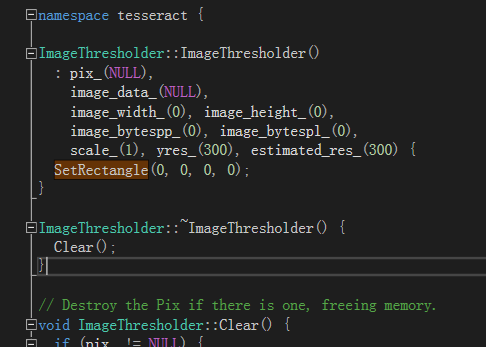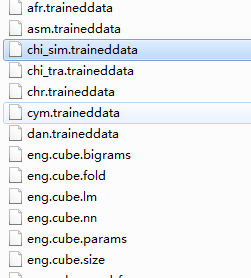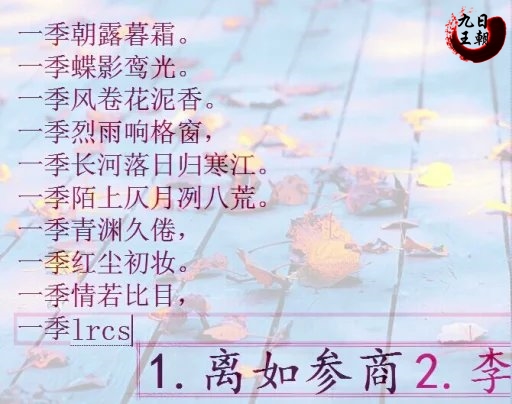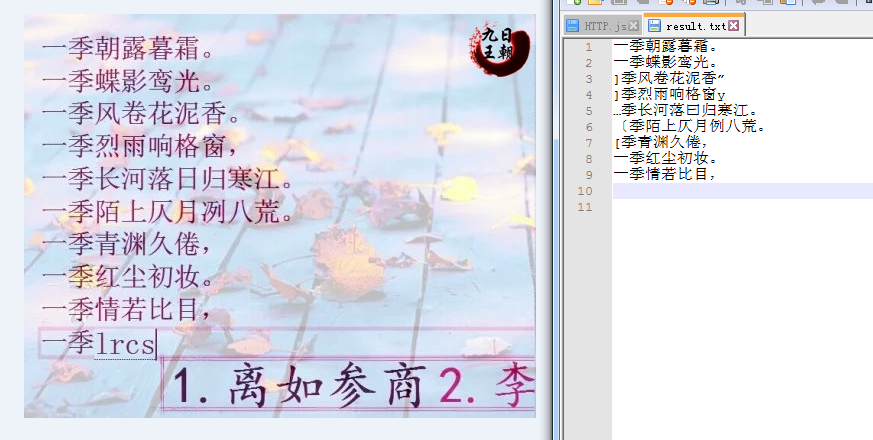Tesseract是一个开源的OCR(Optical Character Recognition,光学字符识别)引擎,可以识别多种格式的图像文件并将其转换成文本,目前已支持60多种语言(包括中文)。 Tesseract最初由HP公司开发,后来由Google接盘填坑。
git网址https://github.com/tesseract-ocr/tesseract
其源码调用栈:
main[api/tesseractmain.cpp] ->
TessBaseAPI::ProcessPages[api/baseapi.cpp] ->
TessBaseAPI::ProcessPage[api/baseapi.cpp] ->
TessBaseAPI::Recognize[api/baseapi.cpp] ->
TessBaseAPI::FindLines[api/baseapi.cpp] ->
TessBaseAPI::Threshold[api/baseapi.cpp] ->
ImageThresholder::ThresholdToPix[ccmain/thresholder.cpp] ->
ImageThresholder::OtsuThresholdRectToPix [ccmain/thresholder.cpp]/**
* Recognizes all the pages in the named file, as a multi-page tiff or
* list of filenames, or single image, and gets the appropriate kind of text
* according to parameters: tessedit_create_boxfile,
* tessedit_make_boxes_from_boxes, tessedit_write_unlv, tessedit_create_hocr.
* Calls ProcessPage on each page in the input file, which may be a
* multi-page tiff, single-page other file format, or a plain text list of
* images to read. If tessedit_page_number is non-negative, processing begins
* at that page of a multi-page tiff file, or filelist.
* The text is returned in text_out. Returns false on error.
* If non-zero timeout_millisec terminates processing after the timeout on
* a single page.
* If non-NULL and non-empty, and some page fails for some reason,
* the page is reprocessed with the retry_config config file. Useful
* for interactively debugging a bad page.
*/
bool TessBaseAPI::ProcessPages(const char* filename,
const char* retry_config, int timeout_millisec,
STRING* text_out) {
int page = tesseract_->tessedit_page_number;
if (page < 0)
page = 0;
FILE* fp = fopen(filename, "rb");
if (fp == NULL) {
tprintf(_("Image file %s cannot be opened!\n"), filename);
return false;
}
// Find the number of pages if a tiff file, or zero otherwise.
int npages = CountTiffPages(fp);
fclose(fp);
if (tesseract_->tessedit_create_hocr) {
*text_out =
"<?xml version=\"1.0\" encoding=\"UTF-8\"?>\n"
"<!DOCTYPE html PUBLIC \"-//W3C//DTD XHTML 1.0 Transitional//EN\"\n"
" \"http://www.w3.org/TR/xhtml1/DTD/xhtml1-transitional.dtd\">\n"
"<html xmlns=\"http://www.w3.org/1999/xhtml\" xml:lang=\"en\" "
"lang=\"en\">\n <head>\n <title></title>\n"
" <meta http-equiv=\"Content-Type\" content=\"text/html; "
"charset=utf-8\" />\n"
" <meta name='ocr-system' content='tesseract " VERSION "' />\n"
" <meta name='ocr-capabilities' content='ocr_page ocr_carea ocr_par"
" ocr_line ocrx_word'/>\n"
" </head>\n <body>\n";
} else {
*text_out = "";
}
bool success = true;
Pix *pix;
if (npages > 0) {
for (; page < npages && (pix = pixReadTiff(filename, page)) != NULL;
++page) {
if ((page >= 0) && (npages > 1))
tprintf(_("Page %d of %d\n"), page + 1, npages);
char page_str[kMaxIntSize];
snprintf(page_str, kMaxIntSize - 1, "%d", page);
SetVariable("applybox_page", page_str);
success &= ProcessPage(pix, page, filename, retry_config,
timeout_millisec, text_out);
pixDestroy(&pix);
if (tesseract_->tessedit_page_number >= 0 || npages == 1) {
break;
}
}
} else {
// The file is not a tiff file, so use the general pixRead function.
pix = pixRead(filename);
if (pix != NULL) {
success &= ProcessPage(pix, 0, filename, retry_config,
timeout_millisec, text_out);
pixDestroy(&pix);
} else {
// The file is not an image file, so try it as a list of filenames.
FILE* fimg = fopen(filename, "rb");
if (fimg == NULL) {
tprintf(_("File %s cannot be opened!\n"), filename);
return false;
}
tprintf(_("Reading %s as a list of filenames...\n"), filename);
char pagename[MAX_PATH];
// Skip to the requested page number.
for (int i = 0; i < page &&
fgets(pagename, sizeof(pagename), fimg) != NULL;
++i);
while (fgets(pagename, sizeof(pagename), fimg) != NULL) {
chomp_string(pagename);
pix = pixRead(pagename);
if (pix == NULL) {
tprintf(_("Image file %s cannot be read!\n"), pagename);
fclose(fimg);
return false;
}
tprintf(_("Page %d : %s\n"), page, pagename);
success &= ProcessPage(pix, page, pagename, retry_config,
timeout_millisec, text_out);
pixDestroy(&pix);
++page;
}
fclose(fimg);
}
}
if (tesseract_->tessedit_create_hocr)
*text_out += " </body>\n</html>\n";
return success;
}
/**
* Recognizes a single page for ProcessPages, appending the text to text_out.
* The pix is the image processed - filename and page_index are metadata
* used by side-effect processes, such as reading a box file or formatting
* as hOCR.
* If non-zero timeout_millisec terminates processing after the timeout.
* If non-NULL and non-empty, and some page fails for some reason,
* the page is reprocessed with the retry_config config file. Useful
* for interactively debugging a bad page.
* The text is returned in text_out. Returns false on error.
*/
bool TessBaseAPI::ProcessPage(Pix* pix, int page_index, const char* filename,
const char* retry_config, int timeout_millisec,
STRING* text_out) {
SetInputName(filename);
SetImage(pix);
bool failed = false;
if (timeout_millisec > 0) {
// Running with a timeout.
ETEXT_DESC monitor;
monitor.cancel = NULL;
monitor.cancel_this = NULL;
monitor.set_deadline_msecs(timeout_millisec);
// Now run the main recognition.
failed = Recognize(&monitor) < 0;
} else if (tesseract_->tessedit_pageseg_mode == PSM_OSD_ONLY ||
tesseract_->tessedit_pageseg_mode == PSM_AUTO_ONLY) {
// Disabled character recognition.
PageIterator* it = AnalyseLayout();
if (it == NULL) {
failed = true;
} else {
delete it;
return true;
}
} else {
// Normal layout and character recognition with no timeout.
failed = Recognize(NULL) < 0;
}
if (tesseract_->tessedit_write_images) {
Pix* page_pix = GetThresholdedImage();
pixWrite("tessinput.tif", page_pix, IFF_TIFF_G4);
}
if (failed && retry_config != NULL && retry_config[0] != '\0') {
// Save current config variables before switching modes.
FILE* fp = fopen(kOldVarsFile, "wb");
PrintVariables(fp);
fclose(fp);
// Switch to alternate mode for retry.
ReadConfigFile(retry_config);
SetImage(pix);
Recognize(NULL);
// Restore saved config variables.
ReadConfigFile(kOldVarsFile);
}
// Get text only if successful.
if (!failed) {
char* text;
if (tesseract_->tessedit_create_boxfile ||
tesseract_->tessedit_make_boxes_from_boxes) {
text = GetBoxText(page_index);
} else if (tesseract_->tessedit_write_unlv) {
text = GetUNLVText();
} else if (tesseract_->tessedit_create_hocr) {
text = GetHOCRText(page_index);
} else {
text = GetUTF8Text();
}
*text_out += text;
delete [] text;
return true;
}
return false;
}
/**
* Recognize the tesseract global image and return the result as Tesseract
* internal structures.
*/
int TessBaseAPI::Recognize(ETEXT_DESC* monitor) {
if (tesseract_ == NULL)
return -1;
if (FindLines() != 0)
return -1;
if (page_res_ != NULL)
delete page_res_;
if (block_list_->empty()) {
page_res_ = new PAGE_RES(block_list_, &tesseract_->prev_word_best_choice_);
return 0; // Empty page.
}
tesseract_->SetBlackAndWhitelist();
recognition_done_ = true;
if (tesseract_->tessedit_resegment_from_line_boxes)
page_res_ = tesseract_->ApplyBoxes(*input_file_, true, block_list_);
else if (tesseract_->tessedit_resegment_from_boxes)
page_res_ = tesseract_->ApplyBoxes(*input_file_, false, block_list_);
else
page_res_ = new PAGE_RES(block_list_, &tesseract_->prev_word_best_choice_);
if (tesseract_->tessedit_make_boxes_from_boxes) {
tesseract_->CorrectClassifyWords(page_res_);
return 0;
}
if (truth_cb_ != NULL) {
tesseract_->wordrec_run_blamer.set_value(true);
truth_cb_->Run(tesseract_->getDict().getUnicharset(),
image_height_, page_res_);
}
int result = 0;
if (tesseract_->interactive_display_mode) {
#ifndef GRAPHICS_DISABLED
tesseract_->pgeditor_main(rect_width_, rect_height_, page_res_);
#endif // GRAPHICS_DISABLED
// The page_res is invalid after an interactive session, so cleanup
// in a way that lets us continue to the next page without crashing.
delete page_res_;
page_res_ = NULL;
return -1;
} else if (tesseract_->tessedit_train_from_boxes) {
tesseract_->ApplyBoxTraining(*output_file_, page_res_);
} else if (tesseract_->tessedit_ambigs_training) {
FILE *training_output_file = tesseract_->init_recog_training(*input_file_);
// OCR the page segmented into words by tesseract.
tesseract_->recog_training_segmented(
*input_file_, page_res_, monitor, training_output_file);
fclose(training_output_file);
} else {
// Now run the main recognition.
if (tesseract_->recog_all_words(page_res_, monitor, NULL, NULL, 0)) {
DetectParagraphs(true);
} else {
result = -1;
}
}
return result;
}/** Find lines from the image making the BLOCK_LIST. */
int TessBaseAPI::FindLines() {
if (thresholder_ == NULL || thresholder_->IsEmpty()) {
tprintf("Please call SetImage before attempting recognition.");
return -1;
}
if (recognition_done_)
ClearResults();
if (!block_list_->empty()) {
return 0;
}
if (tesseract_ == NULL) {
tesseract_ = new Tesseract;
tesseract_->InitAdaptiveClassifier(false);
}
if (tesseract_->pix_binary() == NULL)
Threshold(tesseract_->mutable_pix_binary());
if (tesseract_->ImageWidth() > MAX_INT16 ||
tesseract_->ImageHeight() > MAX_INT16) {
tprintf("Image too large: (%d, %d)\n",
tesseract_->ImageWidth(), tesseract_->ImageHeight());
return -1;
}
tesseract_->PrepareForPageseg();
if (tesseract_->textord_equation_detect) {
if (equ_detect_ == NULL && datapath_ != NULL) {
equ_detect_ = new EquationDetect(datapath_->string(), NULL);
}
tesseract_->SetEquationDetect(equ_detect_);
}
Tesseract* osd_tess = osd_tesseract_;
OSResults osr;
if (PSM_OSD_ENABLED(tesseract_->tessedit_pageseg_mode) && osd_tess == NULL) {
if (strcmp(language_->string(), "osd") == 0) {
osd_tess = tesseract_;
} else {
osd_tesseract_ = new Tesseract;
if (osd_tesseract_->init_tesseract(
datapath_->string(), NULL, "osd", OEM_TESSERACT_ONLY,
NULL, 0, NULL, NULL, false) == 0) {
osd_tess = osd_tesseract_;
osd_tesseract_->set_source_resolution(
thresholder_->GetSourceYResolution());
} else {
tprintf("Warning: Auto orientation and script detection requested,"
" but osd language failed to load\n");
delete osd_tesseract_;
osd_tesseract_ = NULL;
}
}
}
if (tesseract_->SegmentPage(input_file_, block_list_, osd_tess, &osr) < 0)
return -1;
// If Devanagari is being recognized, we use different images for page seg
// and for OCR.
tesseract_->PrepareForTessOCR(block_list_, osd_tess, &osr);
return 0;
}/**
* Run the thresholder to make the thresholded image, returned in pix,
* which must not be NULL. *pix must be initialized to NULL, or point
* to an existing pixDestroyable Pix.
* The usual argument to Threshold is Tesseract::mutable_pix_binary().
*/
void TessBaseAPI::Threshold(Pix** pix) {
ASSERT_HOST(pix != NULL);
if (!thresholder_->IsBinary()) {
tesseract_->set_pix_grey(thresholder_->GetPixRectGrey());
}
if (*pix != NULL)
pixDestroy(pix);
// Zero resolution messes up the algorithms, so make sure it is credible.
int y_res = thresholder_->GetScaledYResolution();
if (y_res < kMinCredibleResolution || y_res > kMaxCredibleResolution) {
// Use the minimum default resolution, as it is safer to under-estimate
// than over-estimate resolution.
thresholder_->SetSourceYResolution(kMinCredibleResolution);
}
thresholder_->ThresholdToPix(pix);
thresholder_->GetImageSizes(&rect_left_, &rect_top_,
&rect_width_, &rect_height_,
&image_width_, &image_height_);
// Set the internal resolution that is used for layout parameters from the
// estimated resolution, rather than the image resolution, which may be
// fabricated, but we will use the image resolution, if there is one, to
// report output point sizes.
int estimated_res = ClipToRange(thresholder_->GetScaledEstimatedResolution(),
kMinCredibleResolution,
kMaxCredibleResolution);
if (estimated_res != thresholder_->GetScaledEstimatedResolution()) {
tprintf("Estimated resolution %d out of range! Corrected to %d\n",
thresholder_->GetScaledEstimatedResolution(), estimated_res);
}
tesseract_->set_source_resolution(estimated_res);
}// Threshold the source image as efficiently as possible to the output Pix.
// Creates a Pix and sets pix to point to the resulting pointer.
// Caller must use pixDestroy to free the created Pix.
void ImageThresholder::ThresholdToPix(Pix** pix) {
if (pix_ != NULL) {
if (image_bytespp_ == 0) {
// We have a binary image, so it just has to be cloned.
*pix = GetPixRect();
} else {
if (image_bytespp_ == 4) {
// Color data can just be passed direct.
const uinT32* data = pixGetData(pix_);
OtsuThresholdRectToPix(reinterpret_cast<const uinT8*>(data),
image_bytespp_, image_bytespl_, pix);
} else {
// Convert 8-bit to IMAGE and then pass its
// buffer to the raw interface to complete the conversion.
IMAGE temp_image;
temp_image.FromPix(pix_);
OtsuThresholdRectToPix(temp_image.get_buffer(),
image_bytespp_,
COMPUTE_IMAGE_XDIM(temp_image.get_xsize(),
temp_image.get_bpp()),
pix);
}
}
return;
}
if (image_bytespp_ > 0) {
// Threshold grey or color.
OtsuThresholdRectToPix(image_data_, image_bytespp_, image_bytespl_, pix);
} else {
RawRectToPix(pix);
}
}
// Otsu threshold the rectangle, taking everything except the image buffer
// pointer from the class, to the output Pix.
void ImageThresholder::OtsuThresholdRectToPix(const unsigned char* imagedata,
int bytes_per_pixel,
int bytes_per_line,
Pix** pix) const {
int* thresholds;
int* hi_values;
OtsuThreshold(imagedata, bytes_per_pixel, bytes_per_line,
rect_left_, rect_top_, rect_width_, rect_height_,
&thresholds, &hi_values);
// Threshold the image to the given IMAGE.
ThresholdRectToPix(imagedata, bytes_per_pixel, bytes_per_line,
thresholds, hi_values, pix);
delete [] thresholds;
delete [] hi_values;
}
同时在输入图像处理时是以坐标参数为基准了,所以支持处理指定区域。
即:api.SetRectangle(0, 0, x, y);
最后说一下安装版的cmd调用方法:
tesseract.exe input result -l chi_sim
input:输入图片
result;输出文本
-l 字体库资源
chi_sim 中文大陆
字体库资源在tessdata文件夹下:
输入图片:
输出图片:
一般都是用jTessBoxEditor进行矫正错误并训练,ps:需要java环境,还是比较麻烦的。
最终生成的也是字体库资源,即在tessdata文件夹下的*.traineddata。如果普通业务需求的话建议从网上或者其他途径获取比较适合自己使用的库资源。
当然如果你的图像文字存在一些规律性或者对输出要把控的很严谨的话还是建议自己训练吧。































 707
707

 被折叠的 条评论
为什么被折叠?
被折叠的 条评论
为什么被折叠?








